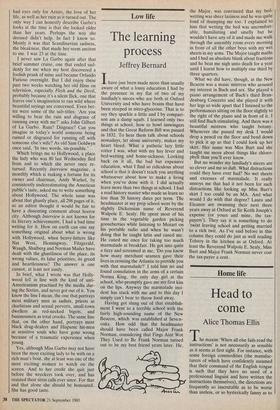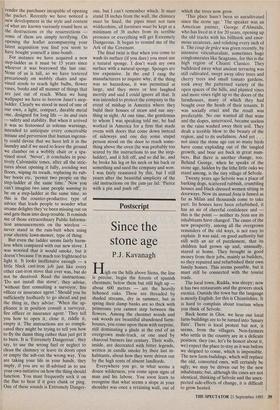Home life
Head to come
Alice Thomas Ellis
The maxim 'When all else fails read the instructions' is not necessarily as sensible as it seems at first sight. For instance, with some foreign commodities (the manufac- turers of which have confidently assumed that their command of the English tongue is such that they have no need of a professional linguist and have written the instructions themselves), the directions are frequently so inscrutable as to be worse than useless, or so hysterically funny as to render the purchaser incapable of opening the packet. Recently we have noticed a new development in the style and content of what are known variously round here as the destructions or the resurrections some of them are simply terrifying. On opening the leaflet accompanying your latest acquisition you find you seem to have bought yourself a time-bomb.
For instance we have acquired a new step-ladder as it must be 15 years since whoever it was borrowed the last one. None of us is tall, so we have teetered precariously on wobbly chairs and spa- vined stools to reach light bulbs, flower vases, books and all manner of things that are just out of reach. When we hang wallpaper we have to borrow Janet's step- ladder. Clearly we stood in need of one of our own, a light, compact, durable metal one, designed for long life — its and ours — safety and stability. But when it arrived it was so festooned in solemn warnings, intended to anticipate every conceivable misuse and perversion that human ingenui- ty could devise that we have left it in the laundry and if we need to leave the ground we clamber on a wobbly chair or a spa- vined stool. 'Never', it concludes in posi- tively Calvinisitic tones, after all the stric- tures about, opening it fully, avoiding wet floors, wiping its treads, replacing its rub- ber boots etc, 'permit two people on the step-ladder at the same time.' Now you can't imagine two sane people wanting to be on a step-ladder at the same time, so this is the counter-productive type of advice that leads people to wonder what arcane delights they've been missing out on and gets them into deep trouble. It reminds me of those extraordinary Public Informa- tion announcements on the wireless never stand in the rain-butt when using your electric lawn-mower, type of thing.
But even the ladder seems fairly harm- less when compared with our new stove. I was worried that it would smoke, but it doesn't because I'm much too frightened to light it. It looks inoffensive enough — a little black cast-iron job just like every other cast-iron stove that ever was, but do not be deceived. Read the instructions. `Do not install this stove', they advise, `without first consulting a surveyor, fire officer or insurance agent.' Should you be sufficiently foolhardy to go ahead and put the thing in, they advise: 'When the ap- pliance is in position consult a surveyor, fire officer or insurance agent.' They tell you how to open it, close it, riddle it, empty it. The instructions are so compli- cated they might be trying to tell you how to fly the damn thing rather than just get it to burn. It is 'Extremely Dangerous', they say, to use the wrong fuel or neglect to clean the chimney or leave its doors open or empty the ash-can the wrong way. You are taking your life in your hands, they imply, if you are so ill-advised as to use your own initiative on how the thing should function. You must frequently sock it on the flue to hear if it goes clunk or ping. One of these sounds is Extremely Danger- ous, but I can't remember which. It must stand 18 inches from the wall, the chimney must be lined, the pipes must not turn widdershins, all furniture must be kept at a minimum of 38 inches from its terrible presence or everything will get Extremely Dangerous. It began to remind me of the Ark of the Covenant.
The final twist is that when you come to wash its surface (if you dare) you must use a natural sponge. I don't wash my own surface with a natural sponge. Sponges are too expensive. In the end I rang the manufacturers to inquire why, if the thing was so hazardous, it was permitted at large, and they more or less laughed merrily and said I could ignore all that. It was intended to protect the company in the event of mishap in America where they build their houses of straw and sue any- thing in sight. At one time, the gentleman to whom I was speaking told me, he had worked in America for a firm that made ovens with doors that come down instead of sideways and one day some stupid person stood on the door to reach some- thing above the oven (he was probably too scared by the instructions to use the step- ladder), and it fell off, and so did he, and he broke his leg or his neck or his back or something and sued the company and won. I was fairly reassured by this, but I still yearn after the beautiful simplicity of the old instructions on the jam-jar lid: 'Pierce with a pin and push off.















































 Previous page
Previous page